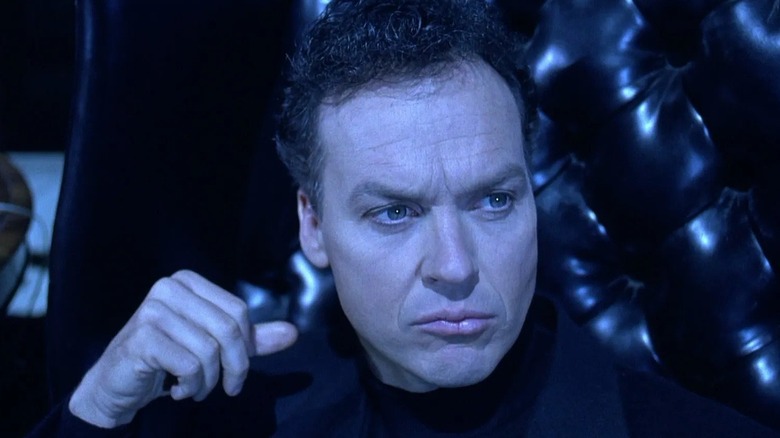
In the TV and film industry, "typecasting" refers to when an actor is consistently given the same kinds of roles. Sometimes, all it takes is a single memorable role for an actor to be cast as a similar character on a regular basis. It can often be a source of frustration for actors who want to branch out and demonstrate their versatility by playing a wide range of characters but are stuck with a label that prevents them from doing so. However, some actors seem to have no problems being constantly cast as the "mad scientist," the "loveable dufus," the "strong silent hero," or another type. After all, a regular paycheck is a regular paycheck.
Some actors have been lucky enough to make a successful career out of sticking to a certain genre only to branch out into roles completely unlike their previous work — often to critical acclaim. Here, we take a look at some of those actors and their best against-type performances.
Seth Rogen — Steve Jobs
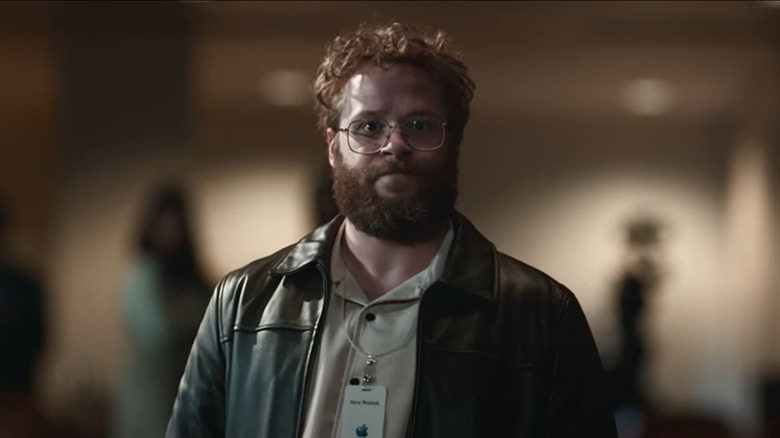
Stretching back to his first role as Ken Miller in the short-lived-yet-still-beloved "Freaks and Geeks," Seth Rogen is well-known for his work in the comedy genre. Comedy writer, director, and producer Judd Apatow was a major part of that show and has cast Rogen in several of his films, most notably "The 40-Year-Old Virgin," "Knocked Up," and "Funny People." Much of Rogen's career has been characterized by raunchy stoner comedy, but he has made forays into more family-friendly fare like "Horton Hears a Who!" and the "Kung Fu Panda" series. Of course, he usually finds his way back to R-rated projects like "Zack and Miri Make a Porno."
While Rogen had flirted with the dramatic in a handful of his earlier works such as 2011's "Take This Waltz," it was his role as Apple co-founder Steve Wozniak in 2015's "Steve Jobs" that proved he was more than capable of handling characters who do more than smoke pot and make nonstop jokes about the male genitalia. In "Steve Jobs," Rogen gives a surprisingly subtle and layered performance as the intelligent and mild-mannered engineer. While Rogen didn't receive any awards recognition (outside of a couple of minor nominations), his performance did garner some early Oscar buzz.
Tom Cruise — Collateral
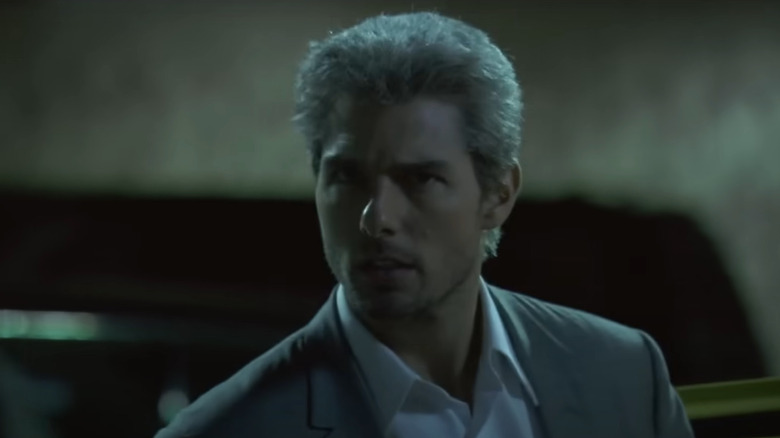
Tom Cruise needs no introduction. Having starred in countless blockbusters, there's a good chance that every person on Earth has seen at least one Tom Cruise film. He first appeared in several films in the early 1980s, achieving his big break in 1983's "Risky Business," which established him as a charming leading man. He followed this up with a string of hit movies that includes "The Color of Money," "Rain Man," and "Born on the Fourth of July," the last of which garnered him his first of three Academy Award nominations. Throughout the 1990s and into the 2000s, Cruise appeared in a wide range of films that spanned multiple genres from horror ("Interview with the Vampire") to comedy ("Jerry Maguire") to sci-fi action ("Minority Report") — almost always as the charismatic protagonist.
However, Cruise took a straight-up villainous turn in 2004's "Collateral," playing a hit man named Vincent who forces a taxi driver to take him from one "job" to another. While Jamie Foxx was the one who got an Oscar nod for his portrayal of the hapless taxi driver, Cruise's performance was highly praised, with Stephen Hunter of the Washington Times writing that "Cruise is the gray-hued symbol of the universe's mayhem in the new Michael Mann film, a killer with an ironic sense of self, a knowledge of jazz, clothes cool enough to get him into GQ, and a remorseless will."
Henry Fonda — Once Upon A Time In The West
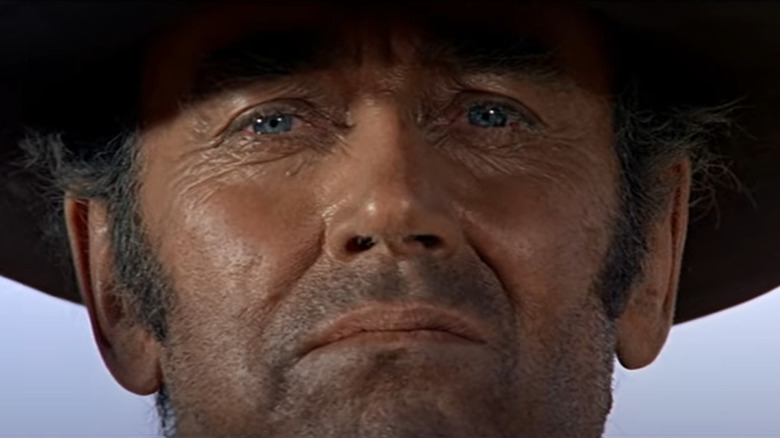
Henry Fonda is regarded as one of the greatest acting talents in Hollywood history and is ranked No. 6 on the American Film Institute's "100 Years...100 Stars." He cultivated a reputation for playing wholesome, soft-spoken characters who belie a quiet, inner strength and integrity. His breakout role was as Tom Joad in 1940's "The Grapes of Wrath" for which he received his first Academy Award nomination. Some of his other standout films include Alfred Hitchcock's "The Wrong Man," the 1957 courtroom drama "12 Angry Men," and his last theatrically-released film, "On Golden Pond," which finally saw him receiving an Oscar for his acting.
Fonda may have been the Tom Hanks of his generation, but he sometimes deviated into darker territory such as his portrayal of the villainous Frank in Sergio Leone's "Once Upon a Time in the West." Audiences had seen Fonda in several Western films before, but he typically played the protagonist in those. Here, he plays a cold-blooded villain who has no compunction about killing entire families. It's a testament to how amazing an actor he was that he was able to pull off such a chilling performance with little more than a steely glance and a loaded gun.
Adam Sandler — Punch-Drunk Love
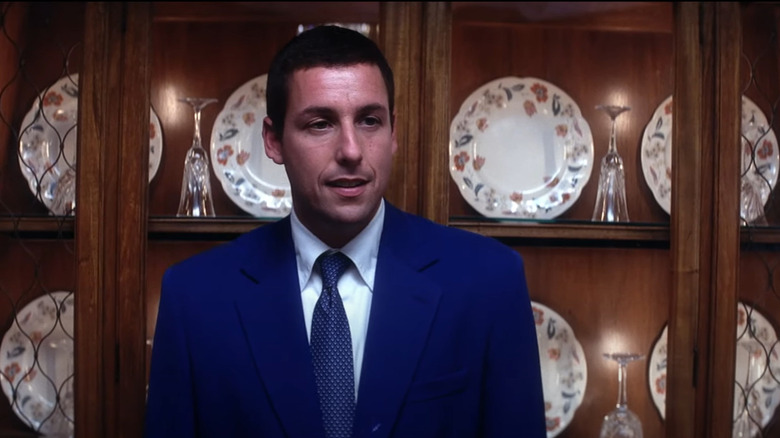
Adam Sandler is one of the most prolific comedic actors in Hollywood. First rising to prominence on "Saturday Night Live," Sandler followed up his stint on the popular sketch show with a string of films throughout the 1990s that showcased his manchild style of humor, including "Billy Madison," "Happy Gilmore," "The Waterboy," "The Wedding Singer," and "Big Daddy." While his type of comedy isn't popular with everyone, he has nonetheless cultivated a large dedicated fanbase, even if many of his films don't resonate as much with mainstream critics (he's got quite a few Razzies to his "credit").
While Sandler has spent much of his career playing the adorable goofball, he's occasionally ventured into more serious roles, starting with his dramatic turn in Paul Thomas Anderson's "Punch-Drunk Love." Sandler's casting as the lonely and socially awkward Barry Egan was a surprising choice for the somber romantic comedy, but it largely won over critics who praised his performance for its blend of sensitivity, anger, and obsession. He was nominated for a Golden Globe and prepared audiences for even more acclaimed dramatic turns later on in his career.
Bruce Willis — Death Becomes Her
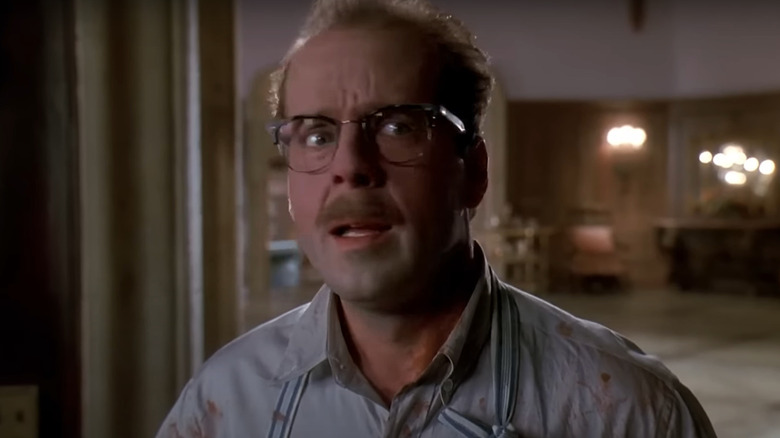
By the early-1990s, Bruce Willis had more than established himself as an action star, almost entirely scrapping his previous persona as a smart-alec yet charming lead in such projects as "Moonlighting." 1988's "Die Hard" and 1990's "Die Hard 2" instantly turned him into a Hollywood heavyweight, a reputation that was only furthered with such action films as "Hudson Hawk" and "The Last Boy Scout." With few exceptions, Willis' work has largely remained within the confines of action, crime, and thriller genres.
However, Willis has dabbled in other genres over the years, often to very good effect such as his role in "The Sixth Sense." However, his first real deviation from the tough guy type happened in 1992's "Death Becomes Her." In the film, he plays a once-successful plastic surgeon named Ernest Menville, whose career downturn has resulted in him becoming a mere reconstructive mortician. Without any trace of John McClane or Joe Hallenbeck, Willis plays Ernest as a complete bozo who keeps bouncing back and forth between the whims of two women who just won't die. It's a hilarious performance that proves just how versatile Willis is as an actor, making his recent retirement all the more tragic.
Tom Hanks — Road To Perdition
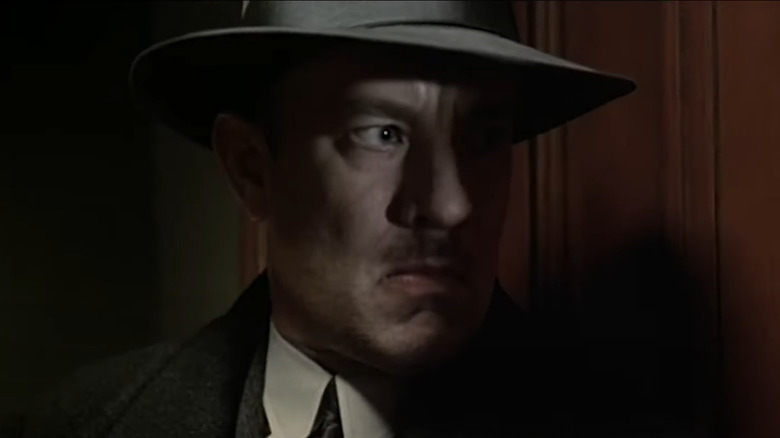
There's a reason why Tom Hanks is widely known as "America's Dad." While some of his earliest films in the 1980s displayed his goofy side, much of his work in the 1990s onward highlighted the mature and wholesome aspects of an onscreen persona that bears more than a little resemblance to Hollywood legend James Stewart. Even when he appeared in darker, more serious films, you could almost always count on Hanks to play someone who represents traditional values like integrity, wisdom, and courage.
Hanks would eventually reveal a sinister dimension of his acting capabilities in 2002's "Road to Perdition" in which he plays Michael Sullivan, a mob enforcer in 1930s Illinois. It's a complex role, as it required Hanks to portray a ruthless dedication to carrying out hits for the criminal business he was raised in while also demonstrating the conflict of trying to keep his young son (Tyler Hoechlin) from going down the same path. Although he deeply cares about his family, Hanks' Sullivan is a villain that can never wash the blood off his hands.
Michael Keaton — Batman
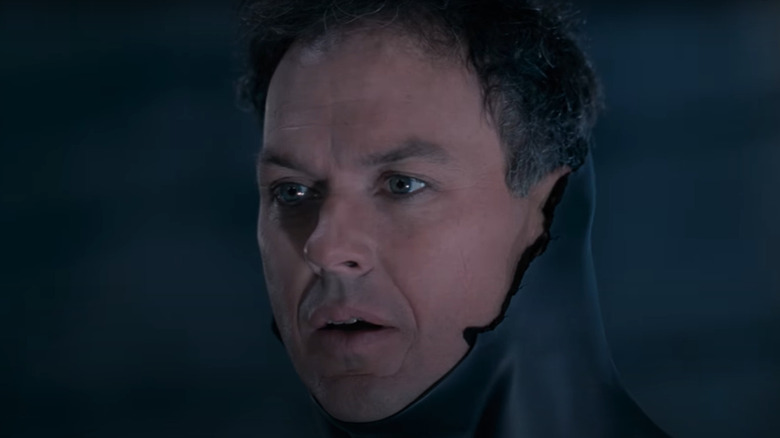
For much of the 1980s, Michael Keaton was known primarily as a comedic actor — and for good reason. His roles in such films as "Mr. Mom," "Johnny Dangerously,' "Gung Ho," and "The Squeeze" were perfect showcases for his quirky and wry comic sensibilities. "Beetlejuice" saw Keaton go full-on gonzo as the troublemaking supernatural title character. It was a performance so filled with over-the-top craziness and physical antics that, had it been made just a few years later, could've been a terrific vehicle for Jim Carrey.
While Keaton flirted with some dramatic roles in films like"Touch and Go" and "Clean and Sober" in the early part of his career, it was his dark and obsessive turn as the Dark Knight in Tim Burton's "Batman" that went against his slyly humorous image. Not everyone was on board with the idea when it was first announced, but Keaton surprised everyone with his performance as the brooding Bruce Wayne. Keaton has always had a twisted edge that makes him totally convincing as a millionaire who beats up thugs while wearing tights.
Jonah Hill — Moneyball
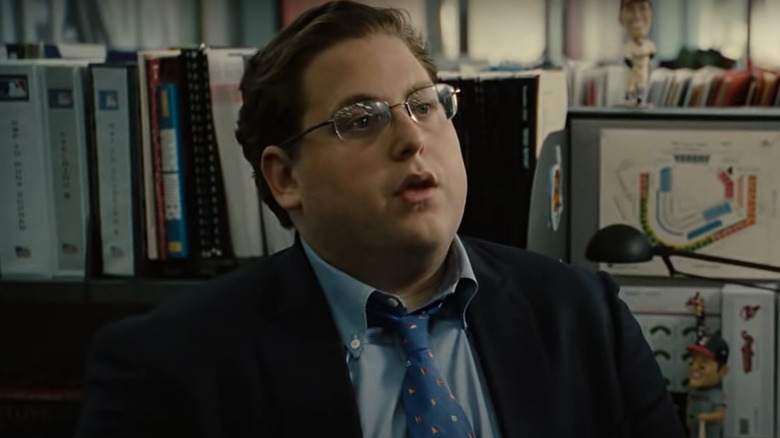
Jonah Hill has taken on a wide range of acting roles throughout his career, but he's still closely associated with the comedy genre. It was in raunchy comedies that the actor first became well-known. After appearing in small parts in such films as "The 40-Year-Old Virgin," "Grandma's Boy," and "Knocked Up," his reputation as a loveable yet foul-mouthed brat was fully established in "Superbad." He followed up on this with similarly-styled roles in other R-rated movies like "Forgetting Sarah Marshall" and "Get Him to the Greek."
Hill more than proved himself capable of handling the more serious fare in 2011's "Moneyball" in which he played the nebbish Peter Brand, a Yale economics graduate who helps Oakland A's general manager Billy Beane (Brad Pitt) put together a winning team. The role was a far cry from the more brash and profane characters Hill usually played up to that point, but he's delightful as the shy yet brilliant sabermetrics expert, and he even scored some Academy love with an Oscar nomination for his performance.
Steve Carell — Foxcatcher
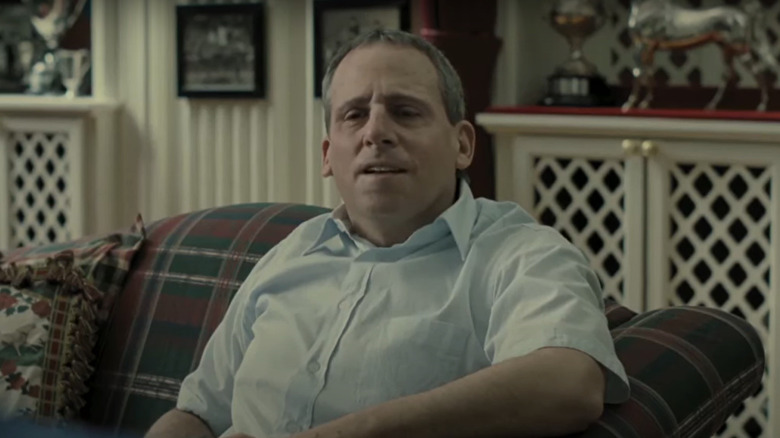
Steve Carell spent much of his formative years appearing in small roles here and there before becoming a correspondent for "The Daily Show." However, the real turning point was when he played Michael Scott, the regional manager of Dunder Mifflin, in the hit show "The Office." That character would get Carell nominated for ten Primetime Emmys and is still beloved by fans today. Carell further cemented his reputation as a talented comic actor in such films as "The 40-Year-Old Virgin," "Get Smart," the "Despicable Me" franchise, and the "Anchorman" films.
While Carell sometimes dabbled in genres outside of comedy, seldom were his roles as serious as that of philanthropist and wrestling enthusiast John Eleuthère du Pont in 2014's "Foxcatcher." The character was a far cry from the adorable quirkiness of Michael Scott and saw Carell completely losing himself in the role with a minimum of dialogue, relying more on subtle yet intense body language to portray a man who's gradually consumed by his obsessive, self-destructive behavior. It also marked Carell's first Oscar nomination.
Christopher Walken — Catch Me If You Can
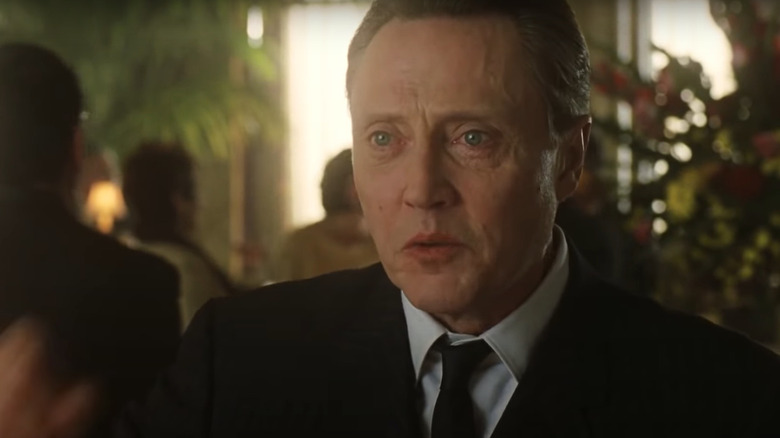
Christopher Walken has had one of the most unpredictable career trajectories of any Hollywood actor ever. His intense demeanor, instantly recognizable voice, and idiosyncratic mannerisms have been featured in a wide variety of films. His big break came in Michael Cimino's 1978 film, "The Deer Hunter," wherein he played Nick, a man whose life has been completely upended by his time serving in the Vietnam War The film garnered Walken his first Oscar. Since then, his versatility has led to him playing everything from a James Bond villain ("A View to a Kill") to a Batman villain ("Batman Returns") to a man who can see the future ("The Dead Zone") to crime bosses ("King of New York," "True Romance").
It seemed that the only type of character that Walken would not play is someone who's normal, but that all changed when he was cast as Frank Abagnale Sr. in Steven Spielberg's "Catch Me If You Can." Playing the father of a young con artist, Walken largely does away with his usual eccentricities to play a mostly decent man whose life is slowly unraveling due to problems with the IRS and an unfaithful wife. His surprisingly vulnerable performance led to him scoring his second Oscar nomination.
Jack Nicholson: About Schmidt
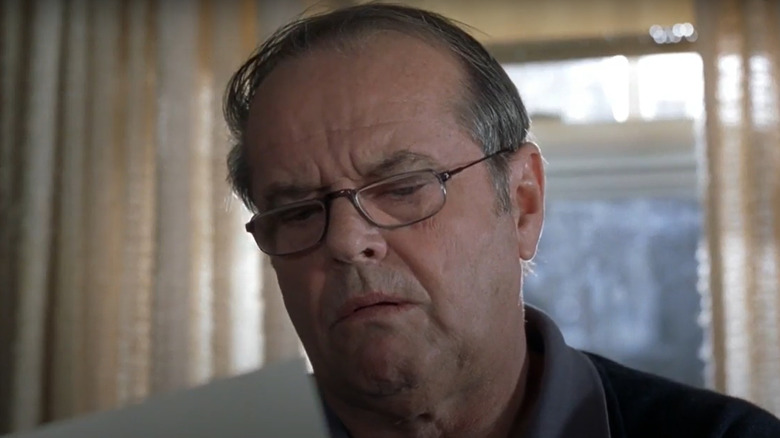
Jack Nicholson is one of the greatest actors to grace the silver screen. With a range that encompasses the rebellious, the sardonic, the intense, and the villainous, it's no wonder he's been nominated for so many Academy Awards (a whopping twelve), winning three. Some of his standout roles include the loveable rascal R.P. McMurphy in "One Flew Over The Cuckoo's Nest," the sly private detective J.J. Gittes in "Chinatown," the delightfully maniacal Joker in "Batman," and the misanthropic author Melvin Udall in "As Good As It Gets."
Like many actors on this list, Nicholson made a name for himself playing larger-than-life characters who are generally devoid of subtlety. However, he made a rare exception to this rule when he appeared in Alexander Payne's "About Schmidt." His character, Warren R. Schmidt, is on the verge of retirement and decides to patch things up with his daughter — who he hasn't talked to in a long time — by going on a road trip to her wedding. Along the way, he experiences some unpredictable encounters that force him to rethink his life. It's a quiet, thoughtful portrayal of a man charged with the task of recreating himself late in life.
Robin Williams — Insomnia / One Hour Photo
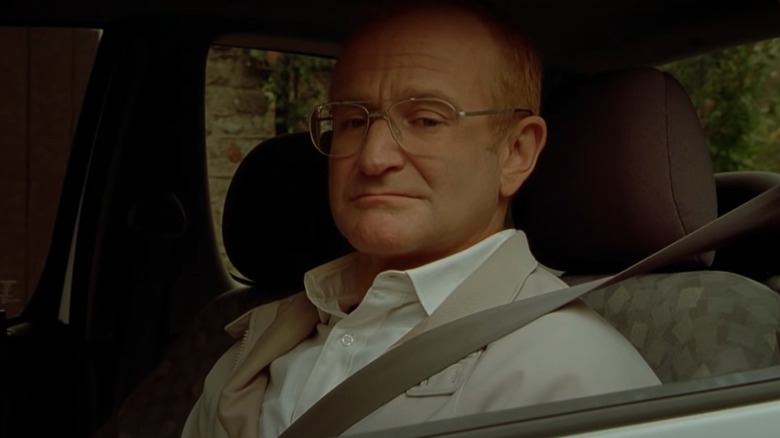
Has there ever been another actor who made the world laugh like Robin Williams? Few can even compete. He burst onto the scene as the quirky alien, Mork, on ABC's "Mork and Mindy," setting the stage for countless goofy and off-the-wall characters in such beloved films as "Aladdin," "Mrs. Doubtfire," "The Birdcage," and many others. He often dipped into more dramatic roles to great effect, his unique sense of humor always shining through — even enhancing — the humanity of these "serious" roles. "Good Morning, Vietnam," "Dead Poets Society," and "Good Will Hunting" are perfect examples.
However, Williams' most blatant deviation from his lighthearted persona occurred in 2002 with "One Hour Photo" and "Insomnia," both of which featured him playing more villainous roles and doing so surprisingly well. "One Hour Photo" sees Williams as a lonely photo technician who becomes obsessed with a family, following them through the pictures he develops for them and trying to force his way into their lives. "Insomnia" has him playing a gentle yet manipulative murderer who knows a dark secret about the detective on his case. It wasn't shocking to see Willaims stray from his comedic roles. It was shocking seeing him play these perverse characters so brilliantly.
Jim Carrey — Eternal Sunshine Of The Spotless Mind
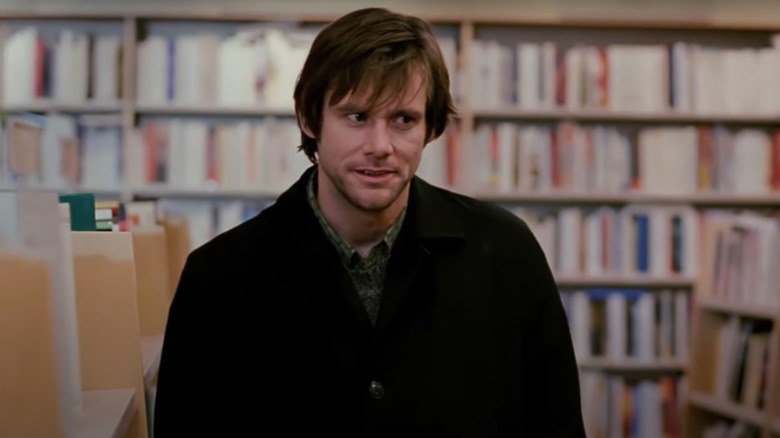
Jim Carrey developed his reputation as a versatile funnyman on the hit show "In Living Color." 1994 was a breakout year for the actor, as it saw him appear in not one, not two, but three comedies: "Ace Ventura: Pet Detective," "The Mask," and "Dumb and Dumber" — each revealing a different shade of his manic persona. Carrey capitalized on the success of these films with "Batman Forever," "The Cable Guy," and the sequel "Ace Ventura: When Nature Calls."
Carrey flirted with his (slightly) more serious side with such movies as "The Truman Show" and "Man on the Moon," but it was his role in Michel Gondry's romantic sci-fi drama "Eternal Sunshine of the Spotless Mind" that proved he has dramatic acting chops. In the film, he plays Joel Barish, who along with his girlfriend, decides to undergo a procedure to erase their memories of one another after a big fight. It's a much more subdued kind of character than the type Carrey generally played up until that point — an awkward but sympathetic milquetoast who's none too great at romance.
Leslie Nielsen — Airplane!
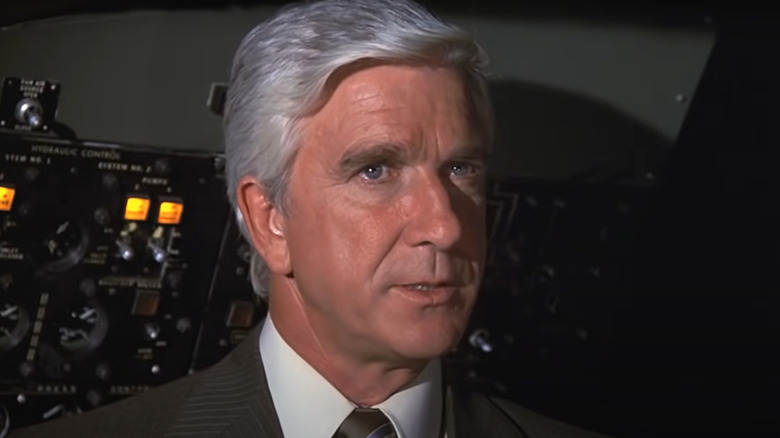
Most people probably believe that the late Leslie Nielsen had been a comedic his entire career. It's easy to understand why. Nielsen didn't make a splash with audiences until the 1980 comedy classic "Airplane!," a riotous sendup of several disaster films from the 1970s. His deadpan delivery and uncanny ability to treat the most ridiculous situation with the utmost seriousness led to him starring in the cop show sendup, "Police Squad!" The series was short-lived, but it spawned the "Naked Gun" series, which put the spotlight squarely on Nielsen's stone-faced humor. From then on, he appeared in a string of parodies throughout most of the rest of his career, including "Repossessed," "Spy Hard," and "2001: A Space Travesty."
This may come as a surprise to pop culture fans, but all of the films listed here are examples of Nielsen being cast against type. Before "Airplane!," Nielsen was mostly known as a dramatic actor. His early career is typified by more serious roles in television, appearing in such programs as "Suspense," "Kraft Theatre," and "Robert Montgomery Presents." His star rose when he appeared in the sci-fi film "Forbidden Planet." He was soon cast in several other MGM productions, including "Ransom!," "The Opposite Sex," and "Hot Summer Night," which are largely forgotten today. However, he did appear in the 1972 hit "The Poseidon Adventure," a film in the disaster genre that he would lampoon in "Airplane!"
Read this next: The 14 Best Film Acting Debuts Of All Time
The post The 14 best against type performances in cinematic history appeared first on /Film.
0 Comments